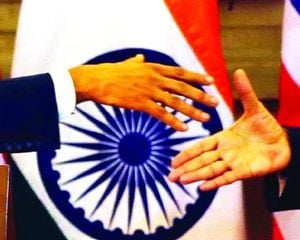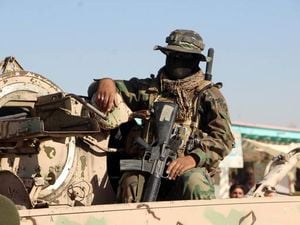North Korea is stepping onto the world stage once again, this time by bolstering Russian forces amid the prolonged conflict with Ukraine. Reports have emerged indicating significant troop movement between the two nations, with estimates ranging up to 100,000 North Korean soldiers potentially being sent to Russia. This military pact has stirred alarm on the geopolitical chessboard, triggering unequivocal responses from South Korea and other nations involved.
Recently, South Korean President Yoon Suk Yeol expressed unwavering determination to not remain passive as his government gathers intelligence about the situation. Addressing the media after discussions with Polish President Andrzej Duda, he termed North Korea's troop deployment as "a provocation" undermining global security. "We won't sit idle over this," he firmly declared. This strong stance reflects the heightened tensions and fears among regional powers, especially with North Korea's military actions increasingly impacting the delicate balance of power.
According to intelligence shared with the South Korean legislative body, over 3,000 North Korean troops have already reached Russian territory, with intentions to expand this number significantly. Observers predict the full deployment could reach up to 10,000 by the close of the year. The initial reports were corroborated by the U.S. defense secretary, Lloyd Austin, who underscored the potential seriousness of the situation.
Meanwhile, President Vladimir Putin, when questioned about the potential for North Korean soldiers to engage directly against Ukrainian forces, surprisingly revealed no denial, stating the handling of military collaboration with Pyongyang rests purely on Russia's modus operandi. This tacit acknowledgment only adds to the chilling prospect of North Korean forces becoming actual combatants within the Russian military framework.
Desperate to retain momentum, Putin has turned to North Korea not simply for boots on the ground; the infusion of troops allows Moscow to sidestep the politically fraught situation of mobilization at home. The Washington-based think tank, the Institute for the Study of War (ISW), posits this partnership allows Putin to avoid announcing another compulsory mobilization which may face public backlash, as experienced after the initial mobilization wave of 300,000 reservists back in November 2022. At the time, this abrupt draft caused significant unrest and dissatisfaction among Russian families.
Putin's maneuvering has not gone unnoticed. Ukrainian President Volodymyr Zelensky commented on the situation as well, calling for immediate consideration among allies to address the bolstering of Russian forces through foreign troop support. On the ground, Ukrainian military analysts assert the current deployment of North Korean troops could culminate in skirmishes along the Ukrainian border, raising alarms about their potential involvement.
Beyond the potential frontline engagement, another layer exists: the economic transactions tied to these troop movements. Reports indicate Russia is remitting about $2,000 per North Korean soldier, leading analysts to suggest most of this payment might not reach the soldiers themselves but rather bolster the coffers of Kim Jong Un’s regime. Military experts speculate the North Korean forces being dispatched could include special operations troops, all aimed at reinforcing areas anticipated to be high-pressure fronts for Ukraine.
The relationship between Russia and North Korea reaches beyond mere military support. South Korean intelligence has indicated Kim is also likely to gain significant resources from this partnership, including substantial food shipments and advancements in technology. These benefits may provide Kim Jong Un with leverage to bypass the stringent international sanctions imposed to hinder his nuclear and missile capabilities.
Despite North Korea's readiness to contribute militarily and financially, analysts caution about its limitations. The ISW has noted even with North Korean reinforcements, Russia might still struggle to sustain its military agenda, especially considering the heavy losses reported on the eastern front. High casualty rates have pushed the Kremlin to rethink the necessity of more troop rotations, as up to 11,000 North Korean soldiers appear poised for deployment.
Overall, the dynamics at play are deeply intertwined with not just military practicalities but also the broader geopolitical ramifications involving China, the United States, and western allies. The continuous pivoting of North Korea and Russia toward each other raises complex questions for the international community. With South Korea and other partners now contemplating their next moves, the world watches anxiously as developments unfurl.



